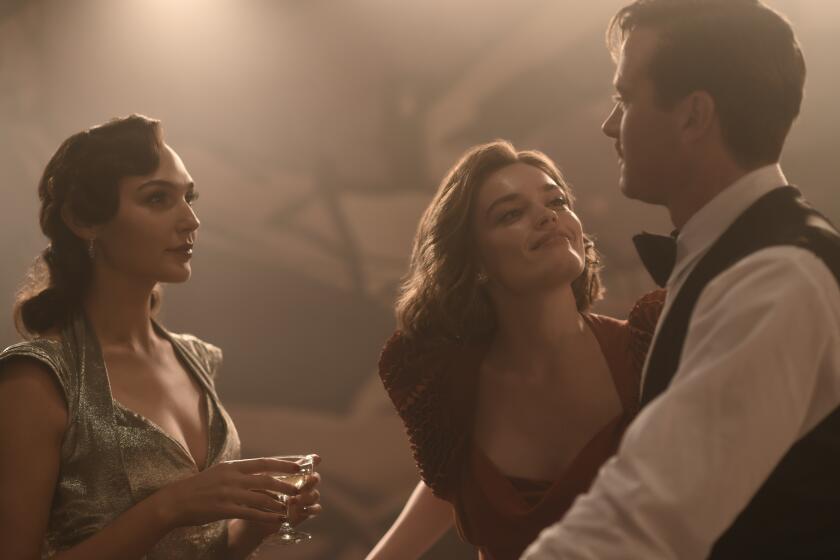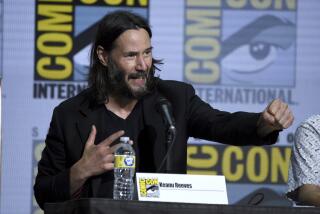Review: Page-to-Screen: Kenneth Branagh misses the boat in ‘Death on the Nile’
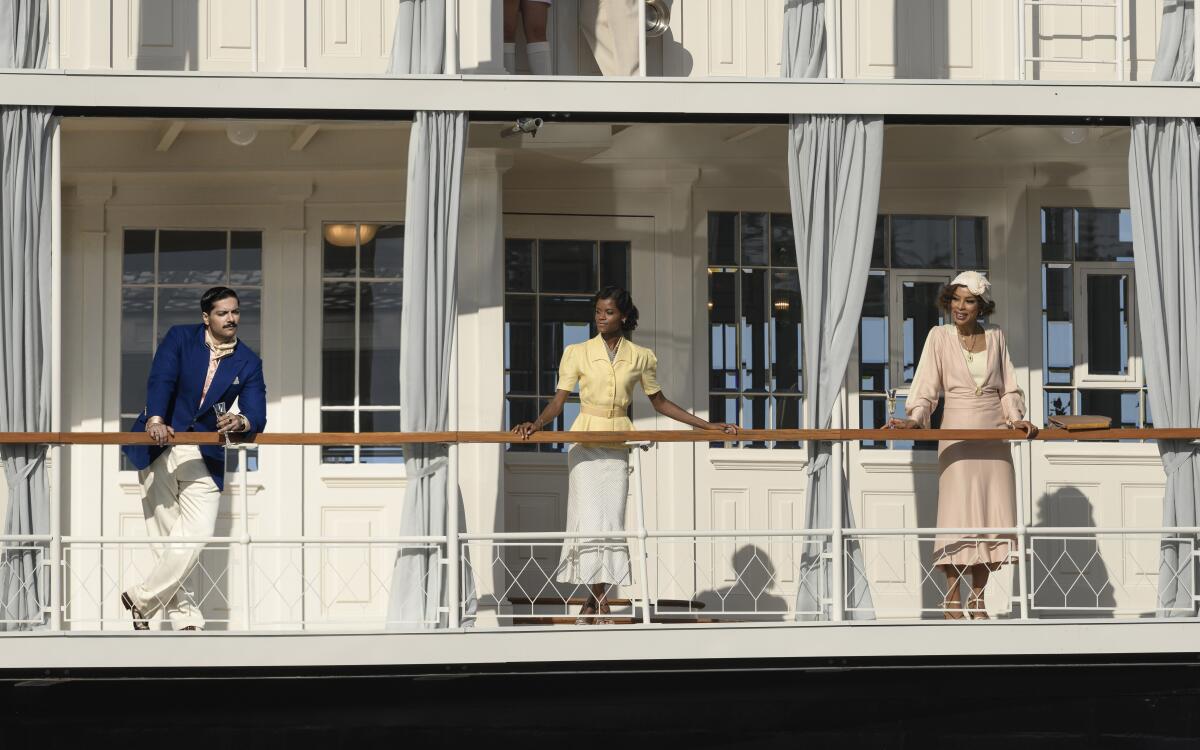
- Share via
Roughly every month, Bonnie Johnson will be taking a critical look at the latest screen adaptations of books — from beloved classics to novels you’d otherwise never have known. This month: Kenneth Branagh’s latest stab at the Agatha Christie universe, “Death on the Nile.”
A Bollywood thriller with dancing suspects, a giallo with huge-haired corpses in deep freeze, a porno with booby-trapped sex toys: Adaptations of Agatha Christie have gone just about everywhere. The British author’s polished puzzles made her the world’s bestselling novelist, and adaptations of her work mirror the evolution of popular media: theater, radio, silent film, international TV, video games. Today, AMC owns a majority stake in Agatha Christie Ltd.; its Acorn streaming platform is a haven for Christie-inspired content. But nearly a century on from detective stories’ “Golden Age,” a big-budget, big-screen adaptation needs to add meaningful value to keep from flogging a dead body.
Kenneth Branagh’s second stab at the Christie canon, “Death on the Nile,” is out this week. It’s an adaptation nobody asked for. For that matter, it’s a Branagh film nobody asked for — yet another vehicle for its actor-director as romantic hero, wrapped in a nostalgic, tone-deaf celebration of colonial luxury travel.
Christie loved Egypt and the Levant; she worked on digs there alongside her archaeologist husband. When she wrote “Death on the Nile” in 1937, colonial troops were beginning to withdraw, and Egypt was entering a fecund cultural period. Yet she barely mentions the natives as anything more than “the Nubians” (or, elsewhere, worse). Like so much of the world for the late British Empire, the Nile was but a playground for her characters and their intrigues.
In adapting Christie’s book more than 80 years later, Branagh had a chance to humanize the Egyptians but he squanders the opportunity, failing to even acknowledge the voyage’s context. While the acclaimed 1978 film version includes troubling depictions of locals, this one leaves them out almost entirely. Here they’re a few dark-skinned faces, dotting the banks of the CGI river, absorbing the customized lighting grid’s sun.
Kenneth Branagh’s Agatha Christie adaptation starring Armie Hammer and Gal Gadot is a decidedly mixed bag.
After years of directing Shakespeare, Branagh has moved on to Marvel properties, and it’s evident in his two Christie films: They lack the restraint and intimacy of her novels, and indeed of his own recent “Belfast.” No longer does the central couple simply betray a close friend by eloping, then take a honeymoon cruise. Now they’re the kind of narcissists who hold an opulent wedding abroad and then kidnap their guests for a floating pajama party of indeterminate length.
Lest we miss the theme of doomed desires, now every subplot echoes it. Characters don’t act out of envy, boredom, compulsion, greed or simple revenge; they’re all slaves to love — maternal, unrequited, closeted, lost — and that includes Hercule Poirot. Like previous filmmakers, Branagh refuses to accept the detective as single, never mind his comfortable asexuality in 55 years of Christie’s books.
Every actor to incarnate Poirot has played him differently: Tony Randall’s screwball, Albert Finney’s brilliantined grouch and Peter Ustinov’s avuncular windbag made the Belgian a figure of fun. In more recent years, Alfred Molina’s melancholic, David Suchet’s soulful innocent and John Malkovich’s penitent exile sought to dignify him. Unlike Christie’s Poirot of the “little gray cells,” Branagh’s likes to brandish a gun. For his “Murder on the Orient Express” (2017), he and screenwriter Michael Green (“Blade Runner 2049”) replaced the book’s opening and its climax with high-stakes action sequences. Now, in their “Death on the Nile,” a gratuitous battlefield scene makes Poirot into a war hero.
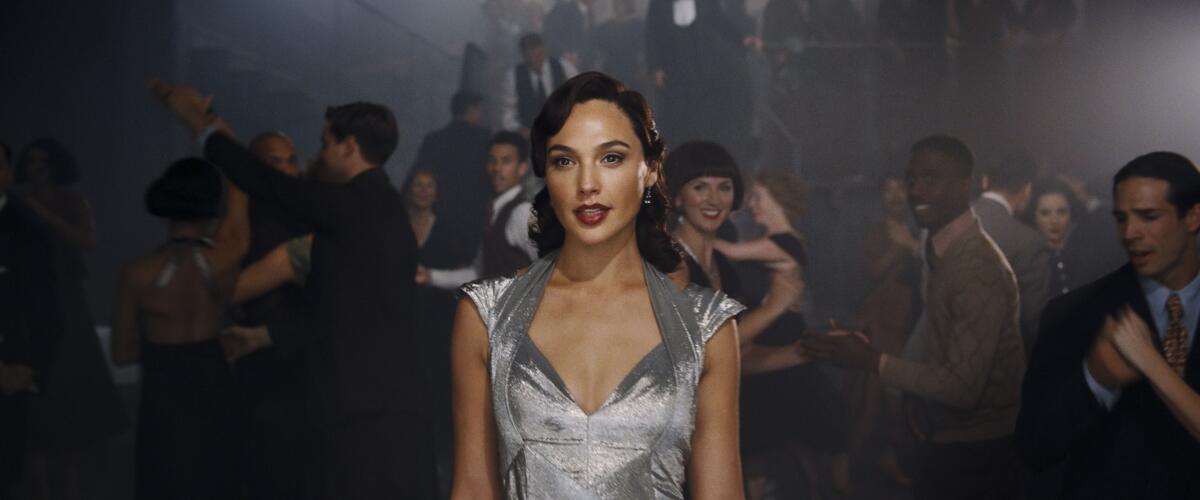
Moreover, whereas their “Orient Express” had the detective prize integrity above all else, in this one he’s happy to be bought, taking on flunky jobs that earlier Poirots declined. Christie herself loathed the sleuth, and in a heated moment of this film, another character voices epithets purloined from the author’s journals (“detestable, bombastic, tiresome, ego-centric little creep”). It would be amusing if Branagh’s portrait of him weren’t so wildly discordant. Instead, it’s perplexing: Has he changed since the last film? Is this one a prequel? Is he a selfless soldier or a glorified mercenary? What transformed him from the farmer of his newly-minted past to a bon vivant in white silk suits? And why a subplot for his mustache now?
In another ambivalent characterization, the newlywed Linnet Ridgeway, who in the book trod a fine line between sympathetic and spoiled, now ricochets between heroine and villainess. Gal Gadot’s undisguised Israeli accent makes her a bewildering choice for the American heiress, a role Emily Blunt nailed in the British TV series “Poirot” (2004).
Right off the bat, representatives of Agatha Christie’s estate had a question for actor and director Kenneth Branagh when they met the first time about adapting the late author’s classic 1934 novel “Murder on the Orient Express.”
Other characters fare no better. Where Christie had a mama’s boy and his mama as fellow passengers, now we have a Jocasta and her son. The film tells us that she’s had a storied career; we see only a helicopter mom played by an ill-used Annette Bening. Other cast members line up unfavorably against the 1978 dream team of Mia Farrow, Jane Birkin, Maggie Smith and Bette freakin’ Davis — though Sophie Okonedo is a highlight as a blues singer, replacing Angela Lansbury’s drunken fabulist. British duo Dawn French and Jennifer Saunders had their own sketch show for decades, but here they have less room to be funny than Christie gave their characters.
Beyond the dearth of Egyptians in Branagh’s Egypt, the movie is clumsy at best in its handling of race. It affects an anachronistic colorblindness among the suddenly-integrated group (two suspects now Black and another South Asian), making only the feeblest acknowledgement of the barriers some of its members would have faced. There are no social impediments to the various interracial friendships and love affairs. It’s an attractive fantasy but hard to accept in light of the colonial setting and the script itself, which still posits class-based discrimination within the wedding party.
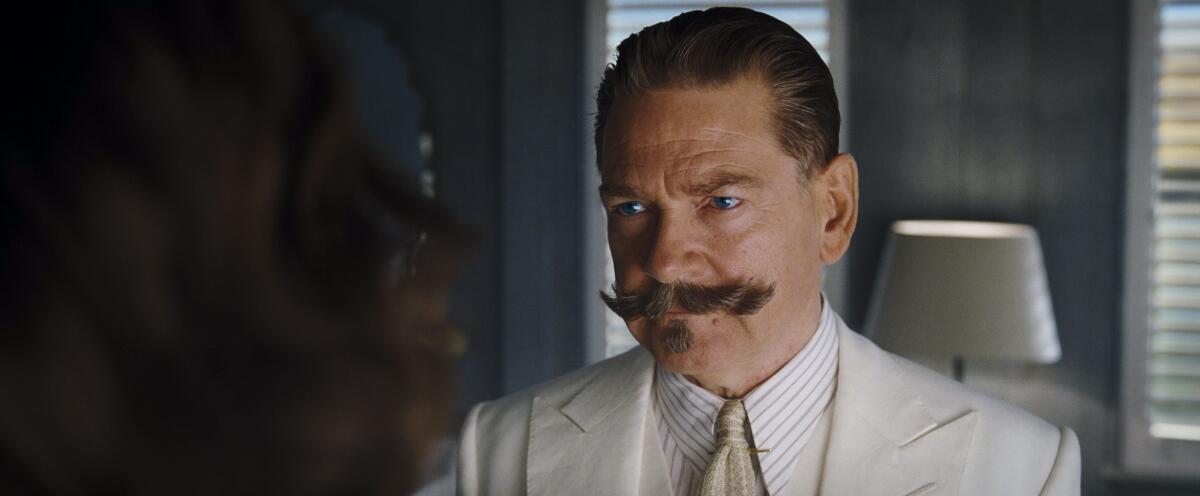
Little of the production’s reported $90-million budget trickled down to Egypt; unlike the earlier film or the “Poirot” episode, this one shot not on location but on sets in England. The crew spent months carving a full-scale Abu Simbel temple out of Styrofoam — which (I guess) will at least end up permanently clogging British rather than African waterways. The film has its visual pleasures, though: The sandstorm at the temple is a nice touch, and shooting through the lounge’s beveled glass windows was a stroke of genius for DP Haris Zambarloukos. The final killing is accomplished by a neat trick.
Perhaps the ultimate piece of incriminating evidence against this film is another whodunit. Around the time this picture went into the can, Rian Johnson released “Knives Out,” which was both a tribute to Christie and her inventions and a pointed critique of the bubble in which her characters lived. Much of what made the author’s books so gratifying was a sense of justice at their conclusions, and Johnson’s film well understood how to stoke that feeling for viewers today.
Where “Knives Out” skewered the suspects for their modern-day hypocrisy, mining our historical moment for tension, humor and conflict, “Death on the Nile” treats present perspective as an inconvenience to work around. There’s no mystery in Branagh’s film, just a dolled-up corpse, ready to bury. Christie fans should instead look forward to “Knives Out 2” this fall. For, as the author ended her book, “It is not the past that matters, but the future.”
“The Mystery of Mrs. Christie” reimagines Agatha Christie’s legendary vanishing; “In League With Sherlock Holmes” offers inspired Conan Doyle fanfic.
Johnson’s work has appeared in the Guardian, the New York Times, Los Angeles Review of Books, the Believer and elsewhere. She lives in Los Angeles.
More to Read
Sign up for our Book Club newsletter
Get the latest news, events and more from the Los Angeles Times Book Club, and help us get L.A. reading and talking.
You may occasionally receive promotional content from the Los Angeles Times.
